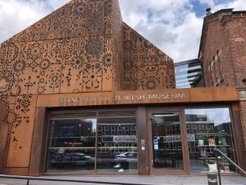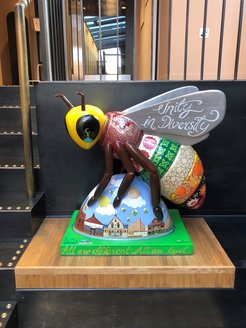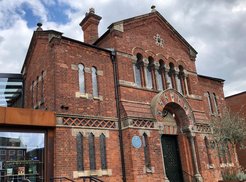Solidarity and Jewish-Muslim Dialogue in the UK
by Yulia Egorova
Blog | December 2021

In recent years, British and, more broadly, European public discourses have involved a range of debates drawing attention to the conditions of minority groups, as well as to the historical circumstances that led to the emergence of these conditions. From the Black Lives Matter movement to initiatives in the decolonization of university curricula, European publics have been invited to reflect on both historical and current experiences of marginalization and discrimination that minority communities have faced. Some of these analyses have involved a comparative dimension which differentiates between the experiences of different groups, when, for instance, in 2018-2020 the British political scene debated definitions of community-specific forms of prejudice, such as antisemitism and Islamophobia, or when in 2021 the Commission on Race and Ethnic Disparities Report recommended disaggregating the term BAME (Black, Asian and minority ethnic) on the grounds that it was allegedly not fit to represent persons stemming from a wide range of migrant identities.

How have these comparative conceptualisations of the positions of different minority groups in the UK been understood within these groups and to what extent are they congruent with a commitment to solidarity shown in different inter-faith and inter-community fora? Building upon seven years of ethnographic fieldwork conducted among participants of initiatives of Muslim-Jewish dialogue in the UK, in my current writing I attempt to address these questions through the prism of my interlocutors’ discussion of their positionalities vis-a-vis each other, and highlight a particular mode of theorising the minority condition that combines solidarity with comparative thinking in ways that draw public attention to specific challenges that different minority groups face without lapsing into competitive accounts of victimhood.
To give an example, participants in one initiative that I have been following, emphasize the common challenges that Jews and Muslims face in the UK as minority groups, but do so without ignoring the historical particularities of these experiences. In our conversations, my interlocutors often describe both Jews and Muslims as minoritized citizens who are equally vulnerable even if this vulnerability has at times transpired differently in relation to different historical or socio-political contexts during the course of their own lifetimes in the UK. They also reflect on the historical experiences of discrimination of European Jews in ways that see them as pertaining to current marginalisation of both Jews and Muslims, rather than relegate them solely to the past or mark as irrelevant for discussions about the position of minorities in contemporary Europe.
The bridges of solidarity that they build between the two groups not only challenge conventional public discourses that construct Jews and Muslims in opposition to each other, but also traverse conceptual boundaries between the notions of religion, race and ethnicity. The initiative welcomes Jewish and Muslim participants who come from different parts of the world and embrace different modalities of religiosity within their traditions, or do not identify as practitioners of any religion at all. Members of other faiths (or none) are also welcome. In the meetings of the network, I have often observed participants engage in robust discussions of issues of common concern for their constituencies, such as, for instance, hate crime, health care and education provision. In these meetings participants are given an opportunity to draw on their experiences and personal or professional expertise irrespective of how they define and express their religiosity or cultural belonging.

I have often witnessed these differences in opinion being respectfully noted but never drawn along ‘community-lines’. For instance, on one occasion, two Muslim participants were invited to present their views on whether UK legislation was equally well equipped to protect both ‘ethnic’ and ‘religious’ minorities from hate crime. One of the speakers suggested that it was. The other one politely disagreed, and these divergent opinions were expressed also by different Jewish and Muslim audience members who supported their arguments by making references to their experiences of being subjected to prejudice and drawing multiple parallels between antisemitism and Islamophobia, even though some also pointed out that the definitions of these terms were contested and not necessarily adequate to describe all their personal experiences with prejudice.
In my participation in the Encounters project, I look forward to exploring these issues by further focusing on Manchester, which is home to sizeable and diverse Muslim and Jewish groups, as well as a site for a range of organised and potentially serendipitous encounters around initiatives such as the Muslim Jewish Forum of Greater Manchester and the Cheetham Cultural Festival. In addition to these fora there are the activities of community-specific but outwardly looking cultural organisations, including the British Muslim Heritage Centre and the Manchester Jewish Museum. Due to its rich history of migration, Manchester also appears to be an important site for a study of individual life histories in both communities, as well as of spontaneous encounters between Jews and Muslims living side by side and in neighbouring areas.














